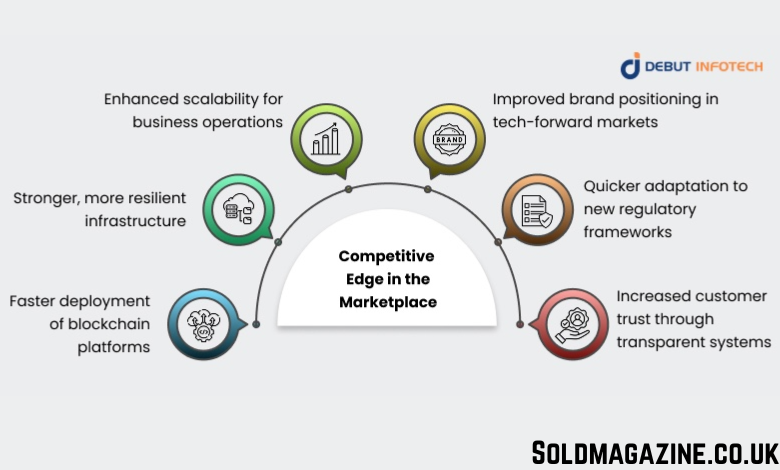In the 21st century, blockchain has become a core part of business innovation. It is a foundational technology for industries such as decentralized finance (DeFi), supply chain management, healthcare, and digital asset ecosystems (stablecoins, tokens, meme coins). Companies are exploring blockchain for novelty and its promise of security, traceability, and efficiency in operations and transactions.
For example, the global blockchain technology market was approximately USD 31.28 billion in 2024 and is projected to grow to USD 1,431.54 billion by 2030, reflecting a compound annual growth rate (CAGR) of about 90.1%.
In addition, the blockchain supply chain market is expected to rise from USD 2.04 billion in 2024 to USD 3.27 billion in 2025, growing at an annual rate of 60.1%. These stats show the urgency for businesses to hire blockchain developers to harness emerging opportunities and guard against falling behind.
This guide will dive into why hiring blockchain developers is a top priority for businesses in 2025.
Strategic Advantages of Hiring Blockchain Developers
Investing in enterprise blockchain development in India and other countries opens the door to measurable advantages that reshape how businesses operate:
1. Custom blockchain solutions
Skilled blockchain developers for hire design frameworks tailored to a company’s unique processes. These blockchain development solutions streamline workflows, reduce inefficiencies, and create systems adaptable to future changes. Instead of relying on generic tools, businesses can build architectures that reflect their priorities, helping them stay competitive as digital ecosystems evolve rapidly.
2. Enhanced security frameworks
Blockchain developers incorporate cryptographic methods, smart contracts, and decentralized consensus to strengthen data security. These frameworks reduce vulnerabilities tied to centralized databases and minimize risks of fraud or tampering. By embedding resilience into the system’s core, businesses establish long-term digital safeguards that customers, regulators, and stakeholders can fully trust.
3. Greater transparency and trust
Blockchain records transactions in immutable ledgers accessible to all authorized parties. This level of traceability builds confidence among partners, customers, and regulators. Developers create mechanisms that ensure every transaction is verified and auditable, reducing disputes while promoting integrity across industries like supply chain management, finance, and healthcare.
4. Streamlined digital transactions
Developers design blockchain systems that remove unnecessary intermediaries, cutting costs and transaction times. This efficiency benefits both internal operations and customer experiences. Whether processing cross-border payments or managing supply contracts, businesses can execute faster, more reliable transactions that align with modern demands for speed, accuracy, and accountability.
5. Improved regulatory alignment
Experienced blockchain developers understand compliance requirements across jurisdictions. By coding compliance checks into blockchain processes, companies reduce the risks of penalties and legal setbacks. These systems help organizations maintain consistent adherence to evolving laws while demonstrating accountability, strengthening trust with regulators and safeguarding long-term business operations.
Competitive Edge in the Marketplace

Companies that prioritize blockchain developers early gain a distinct advantage in their industries. By securing specialized talent, businesses can deploy blockchain projects faster and establish stronger digital infrastructure that competitors may struggle to replicate. Strategic hiring also leads to:
1. Faster deployment of blockchain platforms
Early investment ensures projects move quickly from concept to implementation. With developers in-house, businesses avoid delays tied to outsourcing or slow vendor timelines. This speed allows them to capture opportunities faster, respond to market shifts, and position themselves as agile players in competitive industries.
2. Stronger, more resilient infrastructure
Blockchain development companies build systems designed to withstand cyberattacks, outages, and unexpected failures. This resilience creates long-term stability for core operations. By ensuring networks remain functional and secure, businesses safeguard continuity, maintain customer confidence, and reduce risks that could damage their reputation or lead to costly downtime.
3. Enhanced scalability for business operations
Developers structure blockchain solutions that grow with the organization. Instead of facing bottlenecks as demand rises, businesses benefit from scalable systems capable of handling increasing workloads. This flexibility accommodates growth and positions companies to expand into new markets without sacrificing efficiency or performance.
4. Improved brand positioning in tech-forward markets
Hiring blockchain developers signals innovation to customers, partners, and investors. It shows a commitment to adopting advanced technologies that drive value. This perception elevates a brand’s credibility and opens doors to collaborations, funding opportunities, and customer loyalty in industries that reward forward-thinking approaches.
5. Quicker adaptation to new regulatory frameworks
With expert blockchain consultants on board, businesses can adjust rapidly to changing laws. Developers integrate compliance into blockchain processes, helping organizations avoid disruptions or penalties. This readiness ensures companies stay competitive in regulated sectors like finance and healthcare, where compliance lapses can result in serious consequences.
6. Increased customer trust through transparent systems
Blockchain developers create systems where records cannot be altered, enhancing accountability. Customers gain confidence knowing their data, payments, or contracts are handled securely and transparently. This trust translates into stronger relationships, repeat business, and a competitive advantage that is difficult for rivals to duplicate.
Long-Term ROI of Blockchain Development
When you hire blockchain developers in India and other countries, it is more than a tactical decision. It is an investment with long-lasting returns. Proprietary blockchain systems reduce dependency on third-party platforms, giving organizations greater control and flexibility. The benefits include:
1. Development of proprietary technology unique to the business
In-house blockchain developers design systems aligned with a company’s vision, creating intellectual property that becomes a long-term asset. Proprietary platforms strengthen brand identity, provide customization options, and offer independence from competitors who rely on generic, widely available technologies. This ownership fuels innovation and competitive advantage.
2. Reduced reliance on external vendors and intermediaries
By building blockchain solutions internally, businesses minimize dependence on costly service providers or intermediaries. Developers embed critical functionalities into the system, lowering transaction fees and external risks. This independence streamlines operations, secures valuable data, and creates sustainable cost savings over extended business cycles.
3. Lower long-term operational costs
Blockchain developers introduce automation through smart contracts and decentralized validation, eliminating repetitive manual processes. This efficiency reduces payroll overhead, minimizes administrative errors, and prevents revenue leakage. Over time, the cost savings compound, transforming blockchain adoption from a high initial investment into a reliable, ongoing source of operational efficiency.
4. Streamlined compliance through built-in regulatory features
Skilled developers code compliance protocols directly into blockchain processes, ensuring ongoing alignment with industry regulations. Automated compliance reduces exposure to fines and audits while saving resources dedicated to manual monitoring. This proactive approach reassures regulators and positions businesses as trusted, forward-thinking entities within their industries.
5. Enhanced scalability as markets and technologies evolve
Blockchain developers future-proof systems by creating scalable frameworks that adjust to rising demand and emerging innovations. As markets shift or new technologies appear, businesses avoid costly overhauls. Instead, their systems expand seamlessly, maintaining efficiency and functionality while supporting long-term growth and competitive positioning.
6. Positioning the company as future-ready in a rapidly shifting digital economy
By securing blockchain expertise early, organizations demonstrate adaptability to ongoing technological change. Developers ensure businesses stay ahead of trends, from tokenization to decentralized applications. This readiness signals to stakeholders that the company is well-prepared to thrive in tomorrow’s economy.
Challenges in Hiring Blockchain Developers
While the advantages are substantial, organizations face clear hurdles in securing blockchain expertise:
1. Talent scarcity
The global demand for blockchain developers far outweighs the available supply, creating intense competition for top talent. Companies often struggle to attract skilled professionals, particularly those with proven experience developing scalable blockchain applications, smart contracts, and decentralized systems. This shortage makes recruitment both costly and time-consuming.
2. High salary expectations
Blockchain developers command premium compensation due to their specialized expertise and limited availability. Businesses often find themselves competing with tech giants, startups, and global firms willing to pay higher wages. Meeting these salary demands can strain budgets, particularly for small to mid-sized organizations seeking sustainable blockchain integration.
3. Rapidly changing technologies
Blockchain is evolving at an accelerated pace, with frequent advancements in protocols, platforms, and tools. Developers must continuously upskill to remain effective. Organizations that hire talent without supporting ongoing training risk falling behind, as outdated knowledge can hinder innovation and compromise the quality of deployed blockchain solutions.
4. Integration complexity
Aligning blockchain platforms with existing IT infrastructure is rarely straightforward. Developers face challenges in merging decentralized systems with legacy databases, third-party tools, or regulatory requirements. These complexities extend project timelines, raise costs, and demand higher expertise, making successful integration a significant obstacle for many companies.
Conclusion
In 2025, the decision to hire blockchain developers is no longer optional but a critical business priority. Their expertise enables companies to build secure systems, unlock new efficiencies, and stay compliant in evolving industries.
From DeFi to supply chains and healthcare, blockchain drives transparency and trust. By securing skilled talent early, businesses not only future-proof their operations but also position themselves as leaders in innovation, ensuring lasting value and resilience in an increasingly digital-first marketplace.
Debut Infotech is a reputable partner that offers end-to-end blockchain development services, ranging from custom blockchain platforms to smart contract development and digital asset integration. Their team brings proven expertise, innovative design, and industry-specific knowledge to every project. By working with Debut Infotech, organizations can confidently adopt blockchain with scalable, secure, and future-ready systems tailored to their business goals.




